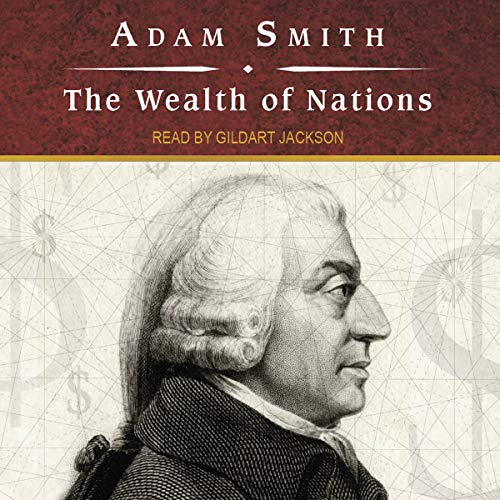Adam Smith’s “The Wealth of Nations” is a seminal work in economics. The audiobook version brings this classic to life.
Adam Smith’s “The Wealth of Nations” is a cornerstone in economic literature. Published in 1776, this groundbreaking work laid the foundation for modern economics and introduced key concepts such as the division of labor, free markets, and the invisible hand.
The audiobook version offers an accessible way to engage with Smith’s ideas, making it easier for listeners to grasp complex economic principles. Narrated in a clear and engaging manner, the audiobook serves as an excellent resource for students, professionals, and anyone interested in economic theory. Dive into this timeless classic to understand the roots of economic thought and its relevance today.

Credit: www.audible.com
The Genesis Of ‘the Wealth Of Nations’
Adam Smith’s monumental work, ‘The Wealth of Nations’, transformed economic thought. This audiobook captures the essence of his ideas. Let’s explore how this masterpiece came to be.
Adam Smith: A Brief Biography
Adam Smith was born in 1723 in Scotland. His mother raised him alone after his father’s death. Smith attended the University of Glasgow at age 14. He later studied at Balliol College, Oxford. Smith’s interests ranged from philosophy to economics.
In 1751, Smith became a professor at Glasgow University. He taught logic and moral philosophy. His lectures covered ethics, rhetoric, and political economy. Smith’s ideas influenced many, including his students and fellow scholars.
The Historical Context Of The Work
The 18th century was a time of change. The Industrial Revolution began in Britain. Trade expanded rapidly, and new technologies emerged. These changes demanded new economic theories. Smith’s work provided answers.
Smith wrote ‘The Wealth of Nations’ during these transformative years. Published in 1776, it addressed the economic challenges of the time. Smith’s insights into labor, productivity, and free markets were revolutionary. His ideas laid the foundation for modern economics.
| Year | Event |
|---|---|
| 1723 | Adam Smith is born |
| 1751 | Smith becomes a professor at Glasgow University |
| 1776 | ‘The Wealth of Nations’ is published |
Smith’s work continues to influence economic thought. Its relevance endures, making it essential reading for anyone interested in economics.
Key Themes And Ideas
Adam Smith’s “The Wealth of Nations” is a cornerstone of economic theory. This audiobook brings the text to life, making it accessible to everyone. Let’s explore some of the key themes and ideas that Smith presents in his work.
The Invisible Hand
Smith introduces the concept of the Invisible Hand. This idea suggests that individuals seeking personal gain unintentionally benefit society. Their self-interested actions promote economic prosperity. This happens without any central planning or control. The Invisible Hand guides resources to their most efficient uses. This helps achieve a balanced and thriving economy.
Division Of Labor
The Division of Labor is another significant theme. Smith explains that breaking down production into simple tasks increases efficiency. Workers become skilled at their specific tasks. This leads to faster production and better quality. The Division of Labor boosts productivity and economic growth.
Free Markets And Economic Growth
Smith advocates for Free Markets as a driver of economic growth. He argues that minimal government intervention allows markets to function best. Competition and innovation thrive in free markets. This leads to wealth creation and improved living standards. Free markets encourage businesses to improve and expand, benefiting society as a whole.
| Key Theme | Summary |
|---|---|
| Invisible Hand | Self-interest unintentionally benefits society. |
| Division of Labor | Breaking tasks down increases efficiency and productivity. |
| Free Markets | Minimal government intervention leads to economic growth. |
Impact And Legacy
Adam Smith’s “The Wealth of Nations” has left a profound impact on economic thought. Its influence spans centuries and continues to shape modern economics. This audiobook version brings Smith’s ideas to a contemporary audience, making his work accessible and engaging.
Influence On Economic Thought
Adam Smith is often called the “father of economics.” His ideas laid the groundwork for classical economics. He introduced concepts like the invisible hand and division of labor. These ideas revolutionized economic thinking.
Smith’s work shifted the focus from mercantilism to free markets. He argued that individuals acting in their self-interest could benefit society. This was a radical change at the time.
His ideas influenced many economists, including David Ricardo and Karl Marx. Smith’s work remains a cornerstone in economic education.
Relevance In Modern Economics
Adam Smith’s ideas are still relevant today. His concepts are foundational in modern economic theory. Many principles he introduced are applied in current economic policies.
Smith’s insights into market dynamics help us understand today’s economies. His emphasis on free markets is evident in global trade practices. The division of labor concept is crucial in today’s industries. It enhances productivity and efficiency.
Smith’s work also influences economic policies and regulations. Governments use his ideas to shape economic strategies. The principles of self-interest and competition are vital in today’s economic environment.
Overall, Adam Smith’s “The Wealth of Nations” remains a significant work in economics. The audiobook version makes these timeless ideas accessible for everyone.

Credit: www.youtube.com

Credit: naxosaudiobooks.com
Conclusion
Exploring “The Wealth of Nations” through an audiobook offers a unique way to absorb Adam Smith’s insights. This timeless classic reveals the foundations of modern economics. Enhance your understanding and enjoy the convenience of listening. Dive into the audiobook and experience the profound impact of Adam Smith’s work.



